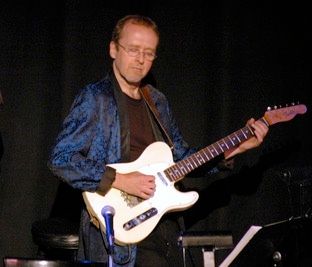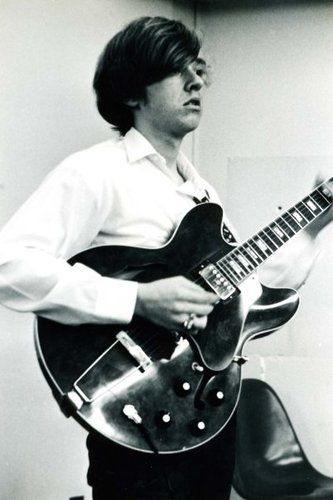
"Guitar Master" George Naha Interview
www.GeorgeNaha.com
Interview by Roger Zee (03/10/21)
Roger Zee: Who inspired you to play the guitar? Do you sing or play any other instruments?
George Naha: I donít know if any one guitarist inspired me right away. I got my first guitar for Christmas in 1966. All the great music coming out at the time excited me. One of the first things I tried to learn by ear, a Robbie Krieger lick, came from the first Doors album. Once I developed a little facility on the instrument, I really dove into Alvin Lee, Eric Clapton, Jimi Hendrix, and Jerry Miller from Moby Grape. My next guitar hero, B.B. King. He taught a lot of us how to play! When I first heard Wes Montgomery, I became totally smitten. Heís still my number one favorite. Later on I got more into the Soul and R&B sound. I love Steve Cropper, Cornell Dupree, Reggie Young, all those guys. So many great guitarists out there. I could go on listing them for a long time.
Two of my guitar teachers, Harry Leahey and Ted Dunbar, greatly influenced me. I learned so much from them and still think about them a lot. Great musicians and teachers.
Iím no singer, but I can do a little harmony here and there. I know where the notes lie on the piano and I use it as an aid in writing and arranging. But I donít feel any real facility on it.
Roger Zee: Talk about some of the musicians and groups you worked with.
GN: One of the nice things about growing older, I enjoy some long time musical relationships. Rob Paparozzi, John Korba, Dan Boone, and I go back to the late Ď60s. And we still play together whenever we can. In the mid Ď70s I started doing jazz gigs, and got to play with some great players like Mack Goldsbury, Steve Nelson, James Spaulding, and Larry Ridley. I donít know if I deserved to share the stage with them, but they put me on some of their gigs! Back then, I also met bassist Tim Tindall, and we went on to play a lot of great gigs together. To this day, heís one of my all time favorite bass players.
In the early Ď80s, I hit the Soul/R&B circuit, starting with Sam & Dave. After they broke up, I kept playing with Sam, and eventually became his Musical Director. I went on to work with Wilson Pickett, Jr. Walker & The All Stars, Carla Thomas, Eddie Floyd, and a whole bunch of other wonderful singers and players. Great times!
From the late Ď80s into the Ď90s I started working with legends like Bernard Purdie, Jerry Jemmott, Paul Griffin, Donald Fagen, Steve Cropper, Duck Dunn. And I also started doing some Broadway work. I played in the house band at the Apollo Theater for about three years, doing the Wednesday night Amateur Shows with Milt Harris & The Apollo Rockers. I learned so much from playing with all those great musicians and performing so many different types of gigs. I consider myself very fortunate.
I later went through a period of doing more commercial work -- weddings, corporate, etc. Those gigs helped pay for a house, but they didn't always musically satisfy. That phase of my life's behind me now that my daughterís an adult. So Iíve gotten back to playing some cooler gigs -- working with Aretha Franklin, Steve Forbert, and playing in a show with music by Sheryl Crow. She's a cool hang! I also put my old band back together, The Sons of Rest, with Tim Tindall, Charlie Caldarola, and Ron Sunshine.
RZ: What guitars, strings, and amplifiers do you currently play?
GN: My main guitar's a í66 Telecaster. I bought it about 28 years ago, and it became my go-to guitar as soon as I brought it home. I also own a Made in Japan (MIJ) Tele Thinline, a í75 Strat, and some other nice guitars. But I mostly use the Tele. I string my solid guitars with DíAdarrio .010s. I set up my hollow guitars more like Jazz boxes, with an .012 for the high E. As far as amps go, I still own my 1970 Twin Reverb, but itís gotten way too heavy as I've grown older! My go-to amp for years now, a beautiful Tone King Comet 40B. Steve Forbert lent me his í66 Princeton Reverb, a very special amp. I also own a Headstrong Lilí King Reverb, modeled after a Blackface Princeton Reverb. Itís another beautiful amp. Though I'm not much of a pedal guy. I love my Analog Man King of Tone. Sometimes, I use a Teese RMC wah-wah.
RZ: Do you teach guitar privately?
GN: I do. I taught at Livingston College back in the Ď70s, and then later for eighteen years at Fairfield University. But I always kept a hand in private lessons as well. Now, I only teach online due to the Pandemic. I miss the ability to play realtime duets with my students. But necessity's the mother of invention. My students and I figured out a system that works well. I like using Zoom, and I recommend The Amazing Slow Downer to all of my students -- itís a great learning tool! I need to update the Lessons tab on my website. Thanks for the reminder, Roger!
RZ: How has the Pandemic affected you? What's on the horizon?
GN: For starters, gigs grew few and far between. Over the last twelve months, I did work some socially distanced gigs and several recording projects. But I'm not nearly as busy as in the past. I also do a few sessions at home, using my iMac and Logic. I want to further develop my skills at that as itís the wave of the future. To me, thereís nothing like recording live, but the modern way tends to more of an overdubbing thing. I like doing that, but playing live makes for more happy accidents!
On the horizon, who knows? Iím dealing with some things now which may influence my decisions, gig-wise, but first things first. The work must come back. Steve Forbertís looking to get going again. So's Bernard Purdie. Hopefully things will start to pick up later this year.
RZ: Describe your most special and/or unusual gig.
GN: Iíll name two very special gigs that occurred in a short span of time. In September 2014, I played with Aretha Franklin on The Letterman Show. My dear old friend Jerry Jemmott recommended me for it. What a great, great gig! The band and the singers, all top notch. And we accompanied The Queen of Soul on nationwide TV! I donít know if it gets much better than that.
The following month, I backed up my old friend Sam Moore of Sam & Dave at Jimmy Scottís memorial service. It took place at The Abyssinian Baptist Church in Harlem, a place of great historical and social significance. They packed the church with fans, dignitaries, and great musicians. I found the chance to add my small part to such a wonderful event both humbling and thrilling.
RZ: How do you see the future of the music business?
GN: Thatís a tough question, Roger. Life is change, and the business has changed enormously since I first got into it. Having said that, the old adage "adapt or perish" continues to ring true. Iím closer to the end of my career than the beginning and aged out of certain types of gigs. So my perspective's different than that of a young person. The business has grown much smaller in a way. A lot of the work we all did when young either no longer exists or pays next to nothing. But there's still a ton of young artists with the urge and need to express themselves. They donít remember "the good old days." They look at the business now and try hard to figure out how to survive in it. Never easy. A lot people fell by the wayside throughout my career, and that will always remain the case. I feel optimistic, though. I think young artists will continue to find a way to get their art out into the world and, hopefully, also reap some financial rewards. I wish them well!
RZ: What advice do you give up-and-coming musicians?
GN: If you love playing music, if you feel passionate about it, never lose it! Connect with the joy of making music every time you go out and play. Not always easy to do, especially if you become a professional. But strive for it. Listen to a lot of music. Learn different styles. Go back and discover the roots of any music you play. Find a good teacher and practice, practice, practice!
Go out and play as much as you can. Meet as many players and singers as possible. Keep your instruments in good repair. Show up on time for everything. Better yet, show up early for everything! Show up prepared for all gigs and rehearsals. If you don't learn your parts by the rehearsal, youíre wasting the other musiciansí time. Be humble, friendly, and supportive. Be a team player. When you play, always listen to whatís going on around you. The art of conversation's based upon listening. Respect your audiences. Without them, you've got nothing. Strive to be a positive force in the world.
RZ: Do you live with any animals?
GN: Not at this point in time. When married, we had a cat named Sophie -- the meanest cat that ever lived! When she passed at 21, we adopted a dog named Sasha. Just a total sweetie, though still with a few issues. Now that I live solo with a crazy, erratic schedule that includes occasional road gigs, I donít think I could subject an animal to so much alone time. Maybe one day my lifestyle will entail less running around. But for now, I feel itís simpler and fairer not to live with a pet.
RZ: How about desert island recordings?
GN: I can think of hundreds of albums Iíd love to bring, from Joni Mitchell, B.B. King, Claude Debussy, to Charlie Parker. If I had to narrow it way down, Iíd try to sneak in all of Wes Montgomeryís Riverside recordings. I own them all in a CD box set. I just love Montgomery's playing. His sophisticated musical thought never sounds "technical" to me. He swung like crazy with such beautiful tone. I donít try to play like him, but I never tire of listening. Thanks for asking me to answer these questions, Roger!
YouTube - Everybody's Cryin' Mercy - The Hudson River Rats
©2021 Roger Zee


